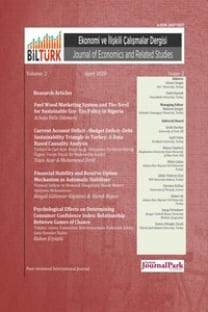The Causal Relationship between Stock Market Unemployment in Turkey
Equity markets provide opportunities investors to invest in firms, while enabling long-term projects to be financed, promoting savings and investments. Public offerings and venture capital models encourage companies to make new investments and expand their business. The purpose of this article is to examine the relationship between the stock market and unemployment by using monthly data in the context of Turkey. The data of the study covers the period between July 2007 and September 2018. The method of research is based on Granger causality test. The empirical results reveal that there are not any significant causality relations between the Borsa Istanbul and unemployment rate. According to results, BIST-100 index could not be successful in predicting future unemployment rates. On the other hand, developments in the stock market should not be trusted to reduce unemployment rates.
Anahtar Kelimeler:
BIST100 index, unemployment, Granger causality test
The Causal Relationship between Stock Market Unemployment in Turkey
Equity
markets provide opportunities investors to invest in firms, while enabling
long-term projects to be financed, promoting savings and investments. Public
offerings and venture capital models encourage companies to make new
investments and expand their business. The purpose of this article is to
examine the relationship between the stock market and unemployment by using
monthly data in the context of Turkey. The
data of the study covers the period between July 2007 and September 2018. The
method of research is based on Granger causality test. The empirical results
reveal that there are not any significant causality relations between the Borsa
Istanbul and unemployment rate. According
to results, BIST-100 index could not be successful in predicting future
unemployment rates. On the other hand, developments in the stock market should
not be trusted to reduce unemployment rates.
Keywords:
unemployment, Granger causality test, BIST100 index,
___
- Aktaş, Metin ve Akdağ, Saffet (2013), “Türkiye’de Ekonomik Faktörlerin Hisse Senedi Fiyatları İle İlişkilerinin Araştırılması”, International Journal of Social Science Research, 2(1), s.50-67.
- Arestis, Philip, Baddeley, Michelle ve Malcolm Sawyer. (2007), “The Relationship Between Capital Stock, Unemployment and Wages In Nine EMU Countries”, Bulletin of Economic Research, 59(2), s.125-148.
- Bayrakdaroğlu, Ali. ve Nazlıoğlu, Şaban. (2009), “Hisse Senedi Fiyat-Hacim İlişkisi: İMKB’de İşlem Gören Bankalar İçin Doğrusal ve Doğrusal Olmayan Granger Nedensellik Analizi”, İktisat İşletme ve Finans, 24(277), s.85-109.
- Demir, Ömer. (2013), Din Ekonomisi: İnanç, Zenginlik ve Mutluluk. Sentez Yayıncılık. İstanbul
- Farmer, Roger. (2012), “The Stock Market Crash of 2008 Caused The Great Recession: Theory and Evidence”, Journal of Economic Dynamics and Control, 36(5), s.693-707.
- Farmer, Roger. (2015), “The Stock Market Crash Really Did Cause the Great Recession”, Oxford Bulletin of Economics and Statistics, 77(5), s.617-633.
- Farsio, Farzad. ve Fazel, Shoko. (2013), “The Stock Market/Unemployment Relationship in the USA, China, and Japan”, International Journal of Economics and Finance, 5(3), s.24. Feldmann, Horst. (2011), “Stock Markets and Unemployment in Industrial Countries”, Applied Economics Letters, 18(9), s.845-849.
- Fitoussi, Jean-Paul (2000), “Roots of The Recent Recoveries: Labor Reforms or Private Sector Forces?”, Brookings Papers on Economic Activity, 2000(1), s.237-311.
- Gökçe, Atilla. (2002), “İMKB’de Fiyat-Hacim İlişkisi: Granger Nedensellik Testi”, Gazi Üniversitesi İktisadi ve İdari Bilimler Fakültesi Dergisi, (3), s.43-48.
- Granger, Clive (1988),“Some Recent Development in A Concept Of Causality”, Journal Of Econometrics, 39(1-2), s.199-211.
- Guo, Hui. (2007), “Stock Market Dispersion and Unemployment”, Economic Synopses, 2007(2007-02),s.13
- Hall, Robert (2017), “High Discounts and High Unemployment”, American Economic Review, 107(2), s.305-30.
- Heil, Mark. (2018), How Does Finance Influence Labour Market Outcomes? A Review of Empirical Studies, OECD Economics Department Working Papers, No. 1495, OECD Publishing, Paris.
- Holmes, Mark ve Maghrebi, Nabil. (2016), “Financial Market Impact On the Real Economy: An Assessment of Asymmetries and Volatility Linkages Between The Stock Market and Unemployment Rate”, The Journal of Economic Asymmetries, 13, s.1-7.
- Jung, Woo. (1986), “Financial Development and Economic Growth: International Evidence”. Economic Development and Cultural Change, 34(2), s.333-346.
- Kilic, Mete ve Wachter, Jessica (2018), “Risk, Unemployment, and The Stock Market: A Rare-Event-Based Explanation of Labor Market Volatility”, The Review of Financial Studies, 31(12), s.4762-4814.
- Lilien, David (1982), “Sectoral Shifts and Cyclical Unemployment”, Journal of Political Economy, 90(4), s.777-793.
- Mcqueen, Grant ve Roley, Vance (1993), “Stock Prices, News, and Business Conditions”, The Review of Financial Studies, 6(3), s.683-707.
- Miao, Jianjun, Pengfei, Wang, ve XU, Lifang. (2016), “Stock Market Bubbles and Unemployment”, Economic Theory, 61(2), s.273-307.
- Mollick, Andre ve Faria, Jao (2010), “Capital and Labor in The long-Run: Evidence from Tobin's Q for The US”, Applied Economics Letters, 17(1), s.11-14.
- Pan, Wei (2018), “Does The Stock Market Really Cause Unemployment? A Cross-Country Analysis”, The North American Journal of Economics and Finance, 44, s.34-43.
- Phiri, Andrew. (2017), “The Unemployment-Stock Market Relationship in South Africa: Evidence from Symmetric and Asymmetric Cointegration Models”, Managing Global Transitions, 15(3), s.231-254.
- Sibande, Xolani; Rangan Gupta, ve Mark Wohar (2018), “Time-Varying Causal Relationship between Stock Market and Unemployment in the United Kingdom: Historical Evidence from 1855 to 2017” (No. 201863). The University of Pretoria, Department of Economics. (1), s.1-19
- TUİK, (2018) .http://www.tuik.gov.tr/UstMenu.do?metod=temelist. Erişim tarihi.29.01.2018
- Wu, Jean. ve Lee, Ming. (2015), “Predicting Severe Simultaneous Bear Stock Markets Using Macroeconomic Variables as Leading Indicators”, Finance Research Letters, 13, s.196-204.
- Zanetti, Francesco (2015), “Financial Shocks and Labor Market Fluctuations”, University of Oxford Economics Working Papers, (746), s.1-41.
- Zhang, Yahong (2018), “Financial Factors and Labor Market Fluctuations”, Economic Modelling, (74), s.24-44.
- Yayın Aralığı: Yılda 4 Sayı
- Başlangıç: 2019
- Yayıncı: Fatih DEYNELİ
Sayıdaki Diğer Makaleler
The Causal Relationship between Stock Market Unemployment in Turkey
The Relationships between Income Inequality & Savings: A Study on Households in Turkey
Terminology of Consumer Confidence Index
Book Review: Defence Economics
Economic Effects of Negative Interest Rate Policy Implementation
The Relationships between Income Inequality & Savings: A Study on Households in Turkey
